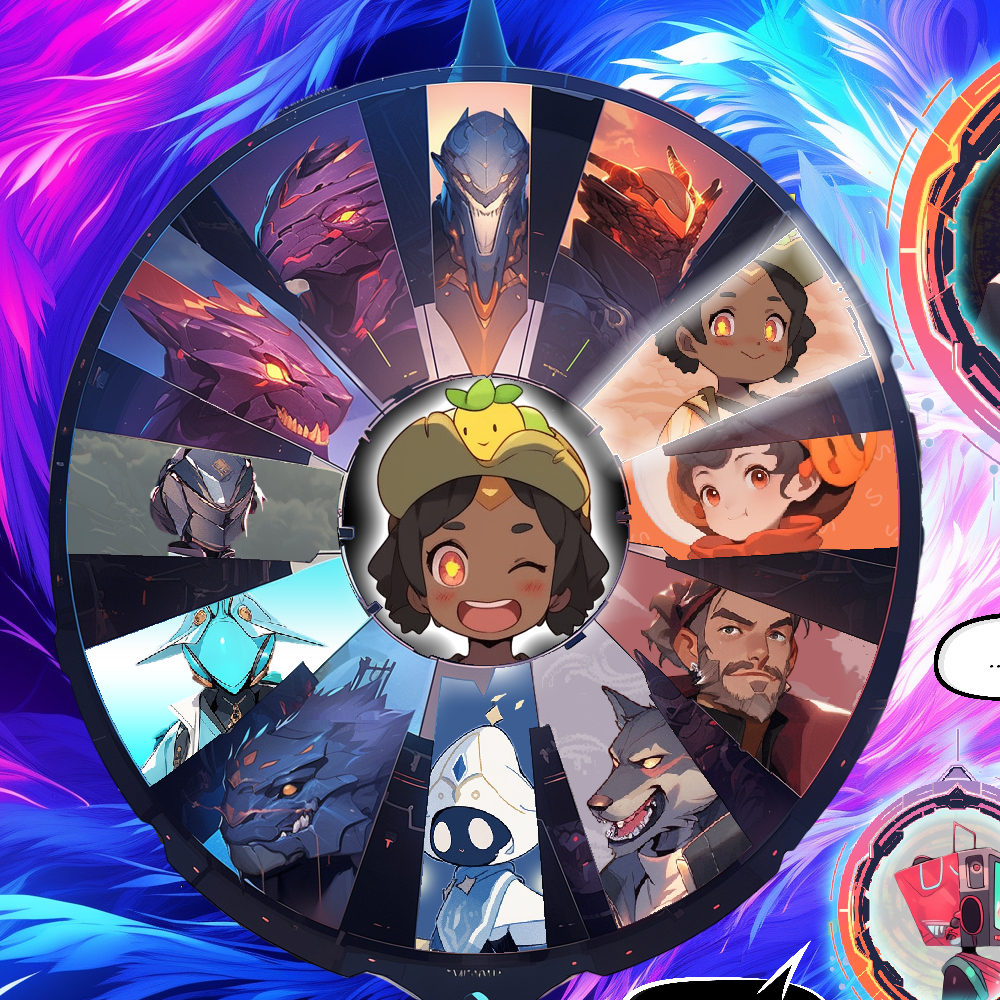Window to a Betterverse: A Preferred Futures Narrative by Vincent Baidoo-Lowe
In the vibrant city of Neo Haven, the sun began to set, casting a warm glow over the neighbourhood. The sound of laughter and excitement filled the air as children finished their sports practice in a park in the centre of squaring streets.
Among them was a young girl named Serene, who had an infectious smile on her face. Bursting with enthusiasm, she ran home, eager to ask her Mum something special.
“Mum, can I have access to the new Verse my friends are talking about?” Serene asked, her eyes sparkling with anticipation.
Her mother, Sarah, listened attentively, understanding Serene’s excitement. With a smile, she nodded and said, “Let’s both check it out first. I’ll send my avatar to join you. I’ll be watching.”
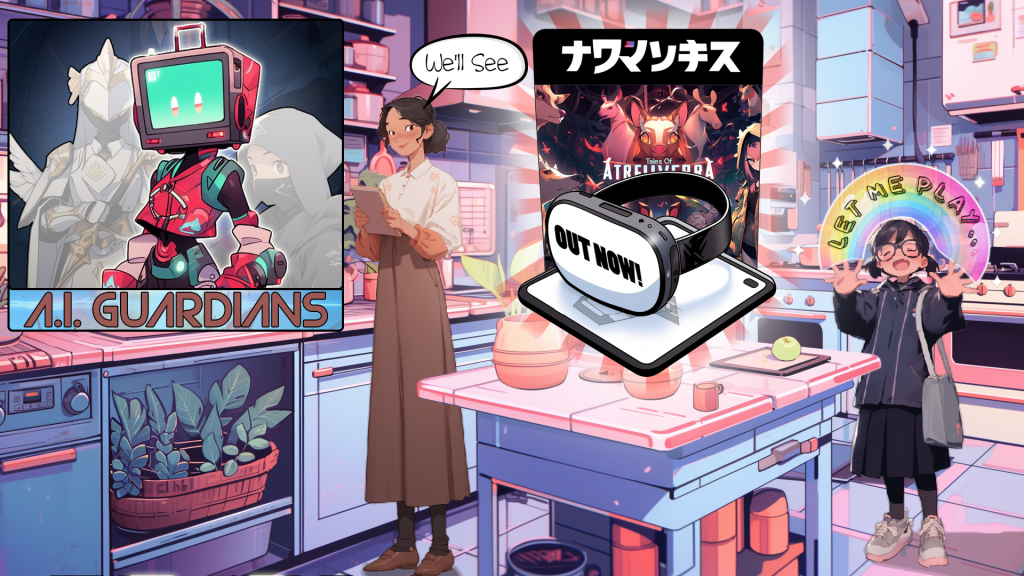
Artwork by Vincent Baidoo ©
With her mother’s approval, Serene couldn’t contain her joy. Sarah activated her AI avatar, a recording guardian A.I, to accompany Serene in the new Verse. As Serene put on her virtual reality headset, Sarah saw the world through her AI’s eyes, ensuring her daughter’s safety.
Sarah’s AI avatar was equipped with the standard parental guidance attributes and assessments including sentiment analysis of general verbal communication looking out for swear-words and unwanted topics, avatar analysis searching for nude simulations, gore visuals or SFX that could cause nausea and database cross-referencing of known problems and bugs.
The AI also had a soft skill as a visual deterrent. You could usually tell by the behaviour of both the guardian AI’s and the Avatars they guarded the nature of their relationship, and just knowing there was someone in the real world looking after an individual would make that Avatar unappealing to most bad actors.
Meanwhile, Serene’s older brother James, an architect, and designer of virtual worlds in his spare time, walked into the room. Hearing their conversation, he nodded in approval. “That new Verse looks really cool. Let me know if you want to borrow one of my avatars to explore it,” he offered.
Serene’s eyes lit up. “Could I use your Flying Shadow Dragon avatar?” she asked eagerly.
James chuckled and shook his head. “Sorry sis, that one has age restrictions. But, I’ve got a safari guide avatar you can use if you want.”
Serene looked down in disappointment, but not surprise.
As James prepared the avatar for Serene, he explained, “Where you’re going this is way better anyway, this avatar has a special skill to communicate with animals. You’ll love the adventures you can have in this world.”
Serene agreed happily and gave her brother a hug before he headed back to his room.
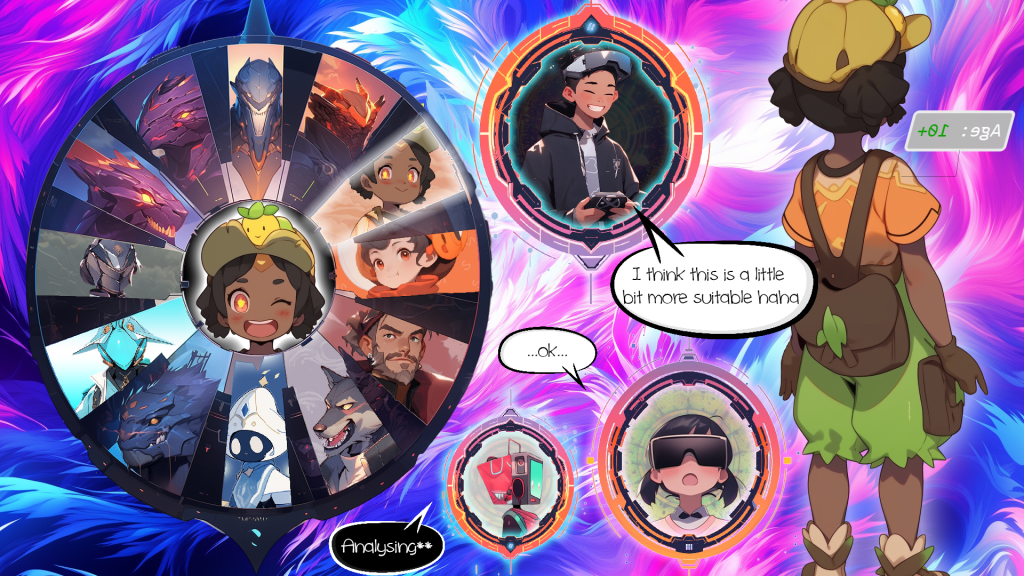
Artwork by Vincent Baidoo-Lowe ©
Serene’s father, Mark, walked in then. Catching the tail end of their conversation he expressed a slight concern about yet another Verse. However, after reading the initial summary of the activities, and reassurance from the AI, he cheerfully agreed to it.
The verbal sentiment analysis concluded that swears were used frequently, but in direct ways easily patched out by in-Verse options or external translators. Topics of conversation were varied but centred around the Verse experiences and didn’t have an intense history of veering into Serene’s avoided topics. Avatar analysis showed that this Verse was considerer successful in banning unwanted Avatars with an average of 2.2 seconds in banning nudity and 0.7 seconds banning gore. Potentially nauseating Avatars could be viewed in this Verse, and so an external plug-in associated with the headset was used to make the Verse safe in that sense.
Through talking to a school of AI butterflies in the new Verse, Serene found a delightful partner game, a game made specifically for two players. Her Mother’s AI didn’t have much experience playing games, so she was eager to share with her cousin, Johnny. Knowing that Johnny’s parents might not permit him to explore more virtual worlds, due to the abundance of options, Serene was determined to convince them otherwise.
Serene, convinced Jonny’s mother, her Auntie to give the new Verse a try. Jonny was currently engrossed in a Verse interface, playing as a robot waitress in a bar. Taking leave of the bar, Jonny joined Serene and the pair embarked on a joyful journey through the partner game.
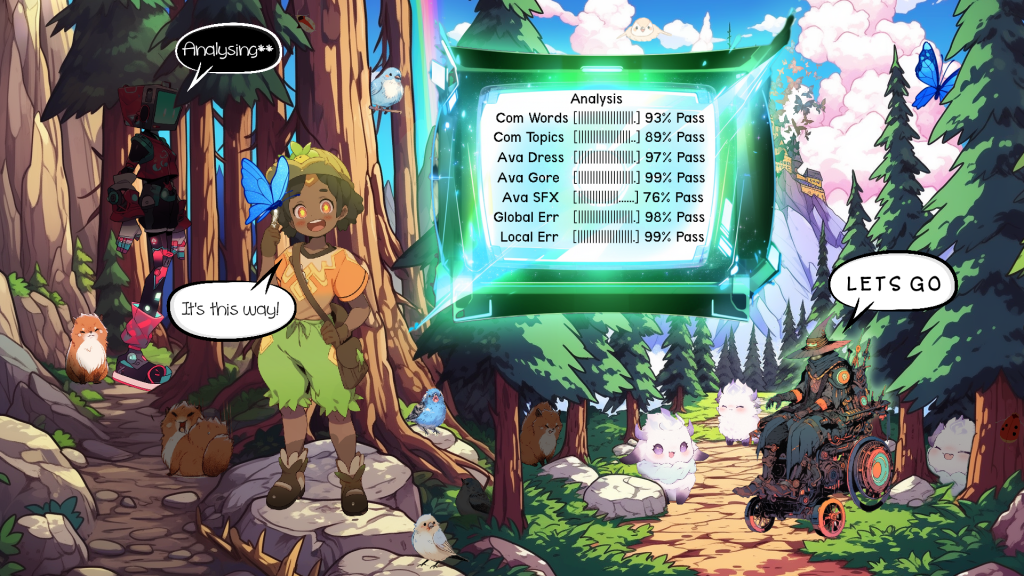
Artwork by Vincent Baidoo-Lowe ©
Back at home, Sarah and Mark were both in the kitchen, preparing dinner. Mark playfully attempted a new dessert recipe, which ended up upside down in the fridge, leaving Sarah with a grin.
Seeing an opportunity to unwind, Mark jumped into a Verse based on jet packs and laser tag. Mark’s Avatars are always as small as the Verse will permit juxtaposing his real life experience. In this Verse he took the very popular choice of embodying a tiny purple astronaut ant. Mark would make the claim he set the trend.
As the intensity of the game increased, Mark began to relax, however, his relaxation was briefly interrupted when someone tried to pitch a business proposal. The proposal actually sounded quite favourable, so he politely declined, set audio boundaries, and told them he would pass the message to his wife.
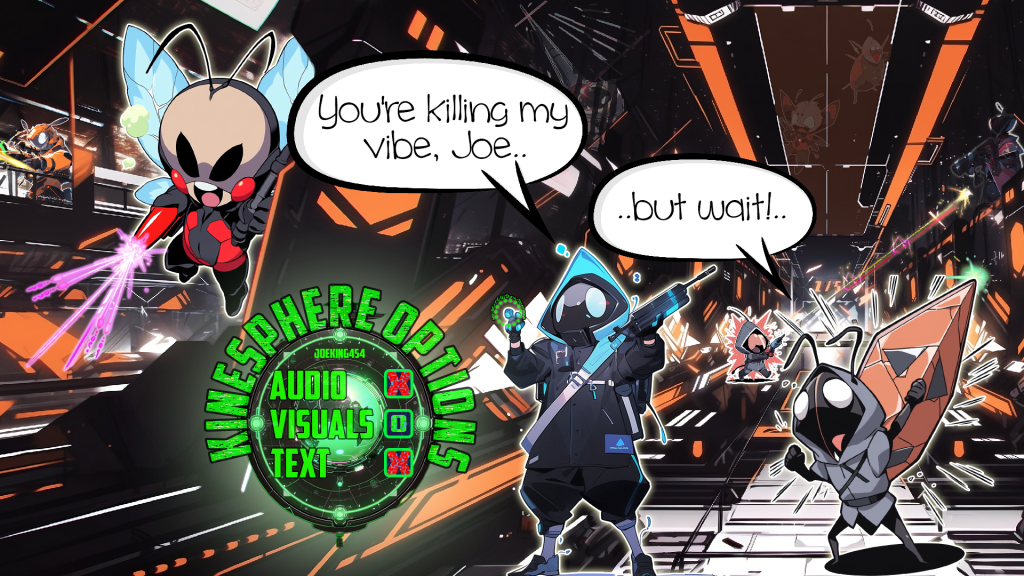
Artwork by Vincent Baidoo-Lowe ©
This jet packs and lasers world was created by James, Mark’s son. The world had became popular due to James mixing his knowledge of architecture and coding. By using a pan-verse avatar system, and the psychology of how people move in spaces, he was able to optimise his experiences allowing them to be enjoyable on low end and high end computers.
At that moment James was working on a big project that from the outside looked like another VR Nightclub venue, but, he planned on using it to springboard a new platform all together. This platform would require official ID on registration, but give all user data to the users.
Many platforms had been created, with different advantages and compromises, all aimed at providing a consistent, unique experience to the customer base. These platforms also offered advantages to developers when on-boarding new users and optimising experiences.
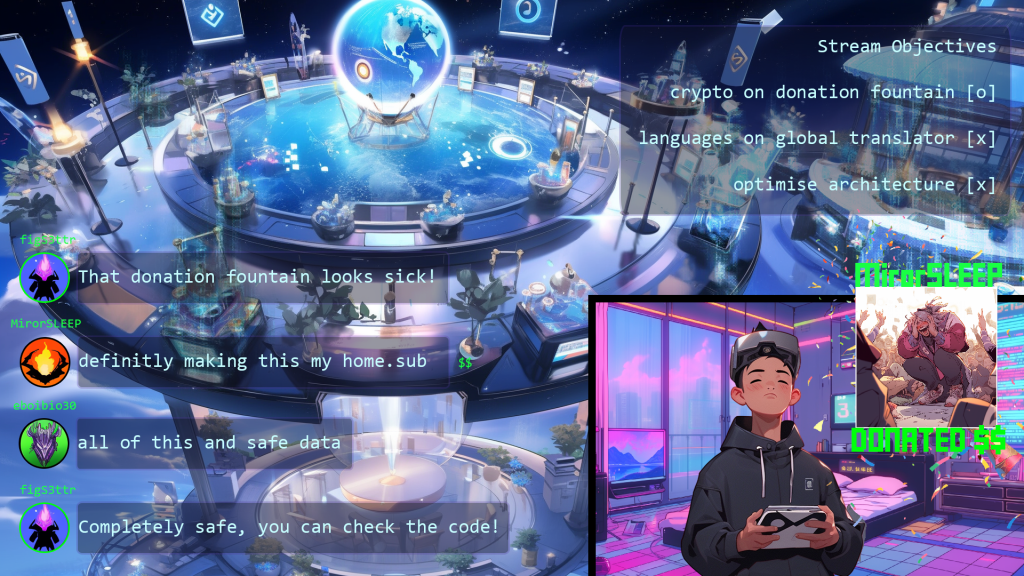
Artwork by Vincent Baidoo-Lowe ©
Sarah tasted the food, and, satisfied with the flavour, used her AI avatar to notify the family that dinner would be ready in 20 minutes, so they should start off-boarding.
Gathered around the table, the family shared stories of their day, in the digital and physical world, laughter echoing through the room.
After the meal, Serene tried to negotiate to stay up a bit longer, but her parents insisted it was time for bed based on the average of a weekly screen time counter. On her way upstairs, she passed them her secondary, smaller glasses, a symbol of her honest attempt to try and sleep. Many Verses pride themselves on optimised experiences and the ability to have there Verse work with old hardware, Serene’s secondary glasses had the power to run to the specs of a gaming setup from around 2024.
James waited for Serene to go to sleep before he left the house, didn’t want to get her excited about another thing. As he passed his parents Mark made a joke about him leaving his computer. James explained that he was going to a club in real life, as suggested by everyone he is working with on the new platform.
Sarah laughed, saying it was a nice way to stop working, but still be working really. Mark payed final compliments on the jet pack world’s popularity as James left.
With Serene tucked up in bed and James off out, Sarah and Mark snuggled on the sofa, watching Verse entertainment on their holographic screen. Sarah transferred the data that her guardian AI had taken to Mark’s guardian AI. Out of habit Mark started tweaking some settings, finding himself in the logs for every Avatar him and his family had ever had.
He and Sarah laughed, remembering long passed trends, sighing at how quickly the children had grown. Together, they marvelled at the vastness of the digital world and how it had brought them closer as a family, fostering imagination, empathy, and genuine connections.
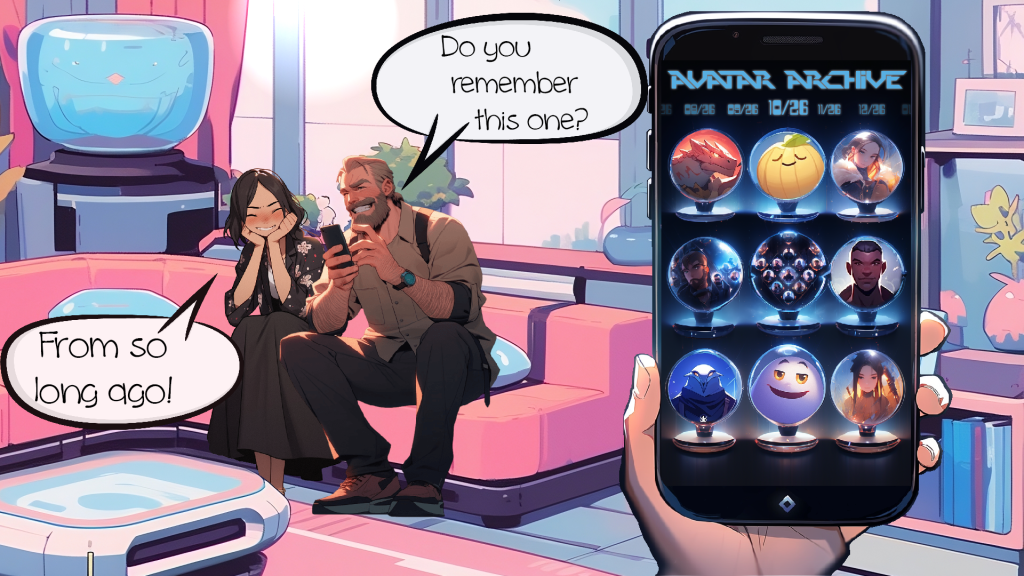
Artwork by Vincent Baidoo-Lowe ©
In a world where the Verse seamlessly blended with reality, the possibilities were endless, and the magic of the digital realm enhanced the joy of life in Neo Haven. The family looked forward to many more Verse adventures together, cherishing every moment of their shared journey in this world of wonders.
Creating a Betterverse – Verity McIntosh
UWE’s partner researcher on the MetaversEngine project, Verity McIntosh explains how this story came to be.
When we set out on this research journey with industry partner, Awarri, I had some passionately-held but pretty abstract ideas about what metaverse avatar systems should be. I was convinced that:
1) people should have the freedom to be represented as they choose in virtual spaces; and for their identities to be diverse, multiple and fluid;
2) people should be able to use avatars without their data being monitored, commodified and used to profile and manipulate them;
3) when people conduct aspects of their lives as avatars in immersive environments, the legal rights and freedoms that they enjoy in the physical world should automatically carry through into the metaverse.
Silas Adekunle from Awarri proposed a radical new approach for a unique avatar design standard. One in which avatars can look, sound, move and express themselves in the way(s) that feel right to the user. And with a back-end that presumes that the user is the default owner of their own data. It would be called, MetaversEngine.
From our research, it became evident that these criteria have little or no overlap with that of the main tech companies building avatar systems right now. Quite the reverse. Avatars are being conceived as gold-mines of commercially useful behavioural data and population-wider profiling/influence. Most companies seem to assume that one’s avatar should appear the same in every corner of the metaverse, probably a photo-realistic version of your physical self…although perhaps thinner, more closely aligned to western beauty standards, wearing a designer-branded hoodie that you paid extra for, and re-aged to appear 22-28 years old.
If we believe the projections, the next generation will spend 10% of their lives as avatars in the metaverse (IET), and a quarter of us will visit the metaverse to work, study, shop and socialise for at least an hour a day by 2026 (Gartner). If we believe even a fraction of that is true, then the systems designed now, really matter.
As we started to develop the project into something more tangible together, these big ideas started to become slippery. Every decision that we could take contained myriad intended and unintended consequences. It was sometimes hard to envisage these choices playing out in real life.
It was then that we started to work with the amazing storyteller and creative technologist, Vince Baidoo-Lowe to develop a MetaversEngine narrative.
We were aware of the sheer volume of dystopian fantasies offering versions of ‘the metaverse’. Films like The Matrix and Minority Report and books like Snow Crash and Ready Player One each demonstrate some version of the future with society in ruins, humanity overcome by technological overlords of our own creation, and plugged in to a novocaine drip of ones and zeros to distract us from the futility of our circumstances. These science fiction narratives can be incredibly powerful and have an important role to play in our cultures. However, when the only vision of the future we can see is Black Mirror, this kind of future can start to feel inevitable. Our sense of our own power, agency to make change, and ability to demand difference can begin to ebb away.
Working with Vince, we wanted to imagine what it would be like if some of the more utopian values we were playing with in MetaversEngine became commonplace. Just a part of the everyday, lived reality of a family in the near future. We drew on a technique called ‘preferred futures’ thinking, and ‘speculative futurism’. Basically, we invited Vince to paint a picture of a future that we might want to live in. A future that embraces and evolves the technologies of the moment, and is shamelessly optimistic about how we might live well with one another in the metaverse frontiers of the future









